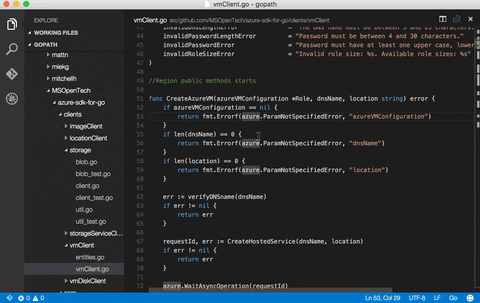This extension adds rich language support for the Go language to VS Code, including:
- Colorization
- Completion Lists (using
gocode) - Signature Help (using
godoc) - Snippets
- Quick Info (using
godef) - Goto Definition (using
godef) - Find References (using
go-find-references) - File outline (using
go-outline) - Workspace symbol search (using
go-symbols) - Rename (using
gorename) - Build-on-save (using
go buildandgo test) - Format (using
goreturnsorgoimportsorgofmt) - Add Imports (using
gopkgs) - [partially implemented] Debugging (using
delve)
First, you will need to install Visual Studio Code 0.10. In the command palette (cmd-shift-p) select Install Extension and choose Go.
In a terminal window with the GOPATH environment variable set to the GOPATH you want to work on, launch code. Open your GOPATH folder or any subfolder you want to work on, then open a .go file to start editing. You should see Analysis Tools Missing in the bottom right, clicking this will offer to install all of the Go tooling needed for the extension to suppport it's full feature set. See the Tools section below for more details.
Note: It is strongly encouraged to turn Auto Save on in Visual Studio Code (File -> Auto Save) when using this extension. Many of the Go tools work only on saved files, and error reporting will be more interactive with Auto Save turned on.
The following Visual Studio Code settings are available for the Go extension. These can be set in user preferences (cmd+,) or workspace settings (.vscode/settings.json).
{
"go.buildOnSave": true,
"go.lintOnSave": true,
"go.vetOnSave": true,
"go.buildFlags": [],
"go.lintFlags": [],
"go.vetFlags": [],
"go.useCodeSnippetsOnFunctionSuggest": false,
"go.formatOnSave": false,
"go.formatTool": "goreturns",
"go.goroot": "/usr/local/go",
"go.gopath": "/Users/lukeh/go"
}In addition to integrated editing features, the extension also provides several commands in the Command Palette for working with Go files:
Go: Add Importto add an import from the list of pacakges in your Go contextGo: Current GOPATHto see your currently configured GOPATHGo: Run test at cursorto run a test at the current cursor position in the active documentGo: Run tests in current packageto run all tests in the pacakge containing the active documentGo: Run tests in current fileto run all tests in the current active document
To use the debugger, you must currently manually install delve. See the Installation Instructions for full details. On OS X it requires creating a self-signed cert to sign the dlv binary.
Once this is installed, go to the Code debug viewlet and select the configuration gear, placing the following in your launch.json:
{
"version": "0.2.0",
"configurations": [
{
"name": "Launch",
"type": "go",
"request": "launch",
"mode": "debug",
"program": "${workspaceRoot}",
"env": {},
"args": []
}
]
}The program option can refer to a package folder to debug, or a file within that folder.
The mode parameter can be set to:
debugto compile the contents of the program folder and launch under the debugger. [default]testto debug tests in the program folder.execto run a pre-built binary instead of building the current code in the program folder.
You can set up a development environment for debugging the extension during extension development.
First make sure you do not have the extension installed in ~/.vscode/extensions. Then clone the repo somewhere else on your machine, run npm install and open a development instance of Code.
rm -rf ~/.vscode/extensions/lukehoban.Go
cd ~
git clone https://github.com/Microsoft/vscode-go
cd vscode-go
npm install
code . You can now go to the Debug viewlet and select Launch Extension then hit run (F5).
In the [Extension Development Host] instance, open your GOPATH folder.
You can now hit breakpoints and step through the extension.
If you make edits in the extension .ts files, just reload (cmd-r) the [Extension Development Host] instance of Code to load in the new extension code. The debugging instance will automatically reattach.
To debug the debugger, see the debugAdapter readme.
The extension uses the following tools, installed in the current GOPATH. If any tools are missing, you will see an "Analysis Tools Missing" warning in the bottom right corner of the editor. Clicking it will offer to install the missing tools for you.
- gocode:
go get -u -v github.com/nsf/gocode - godef:
go get -u -v github.com/rogpeppe/godef - golint:
go get -u -v github.com/golang/lint/golint - go-find-references:
go get -u -v github.com/lukehoban/go-find-references - go-outline:
go get -u -v github.com/lukehoban/go-outline - goreturns:
go get -u -v sourcegraph.com/sqs/goreturns - gorename:
go get -u -v golang.org/x/tools/cmd/gorename - gopkgs:
go get -u -v github.com/tpng/gopkgs - go-symbols:
go get -u -v github.com/newhook/go-symbols
To install them just paste and run:
go get -u -v github.com/nsf/gocode
go get -u -v github.com/rogpeppe/godef
go get -u -v github.com/golang/lint/golint
go get -u -v github.com/lukehoban/go-find-references
go get -u -v github.com/lukehoban/go-outline
go get -u -v sourcegraph.com/sqs/goreturns
go get -u -v golang.org/x/tools/cmd/gorename
go get -u -v github.com/tpng/gopkgs
go get -u -v github.com/newhook/go-symbolsAnd for debugging:
- delve: Follow the instructions at https://github.com/derekparker/delve/wiki/Building.

